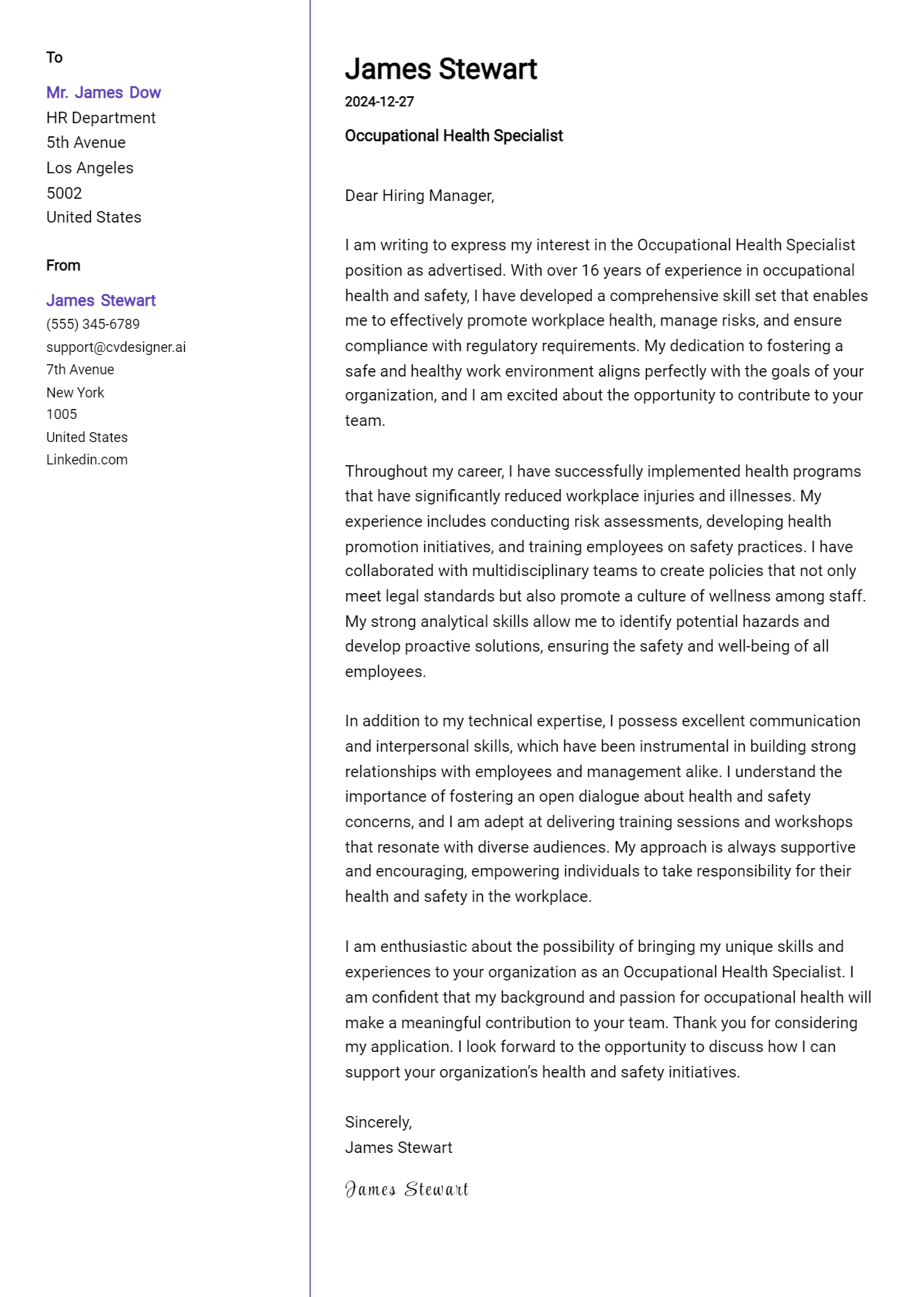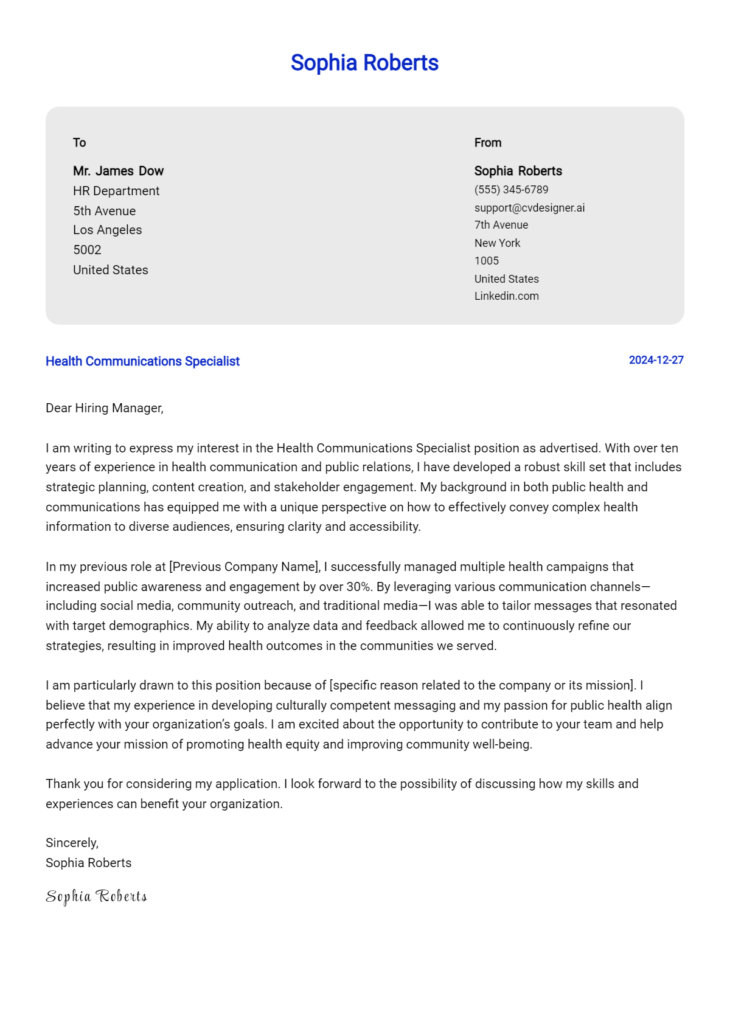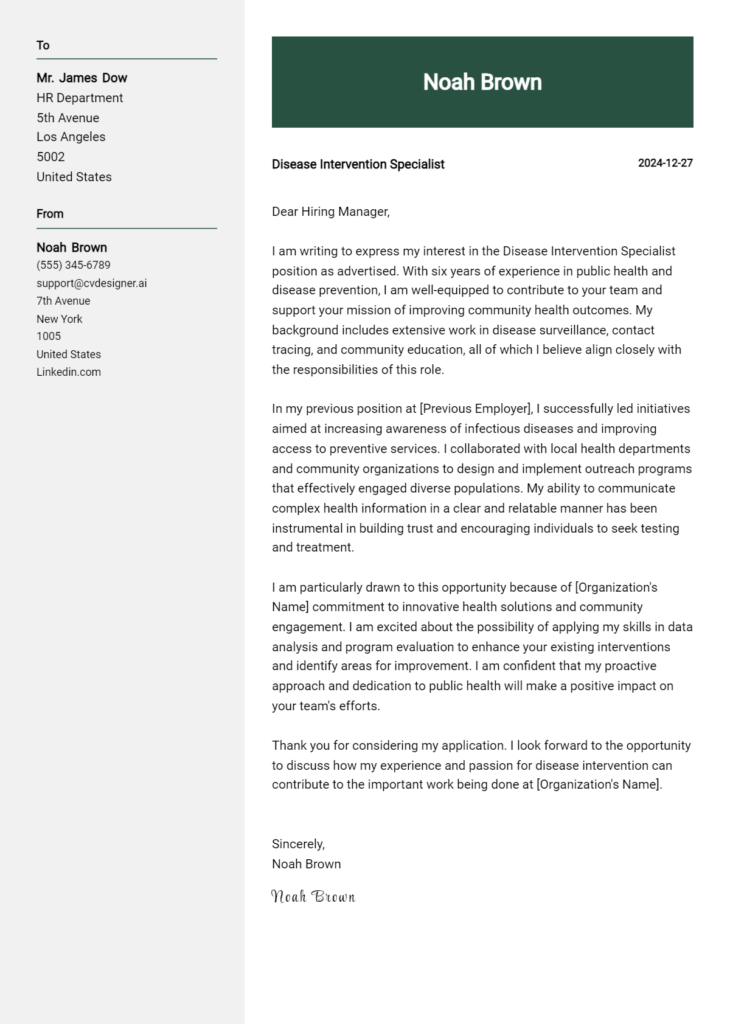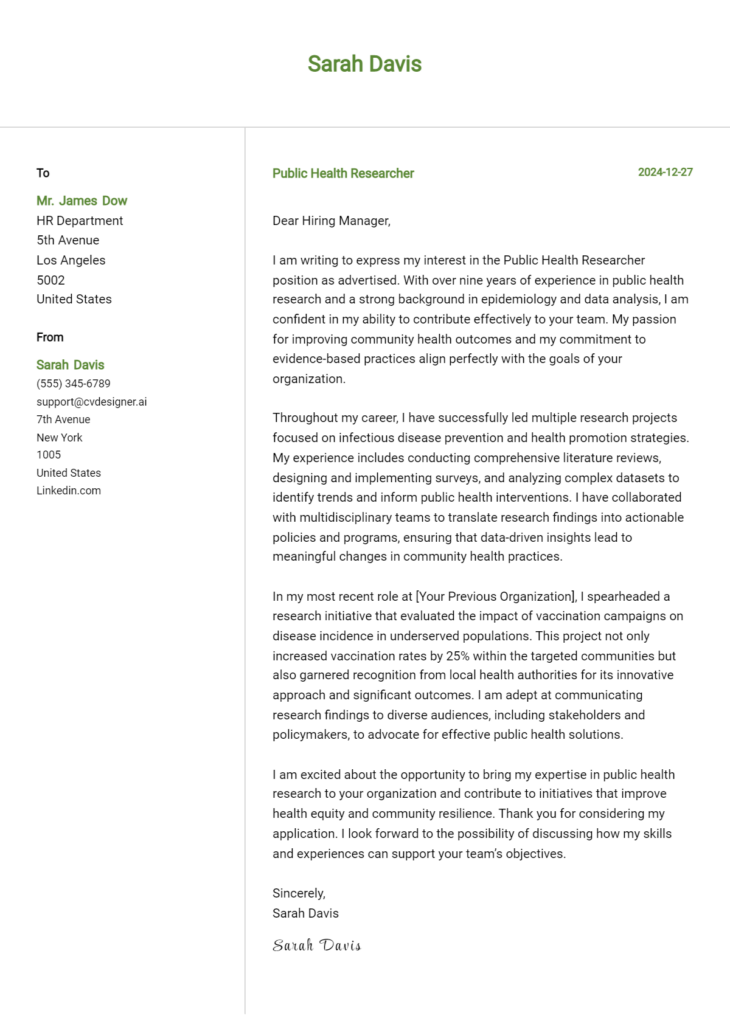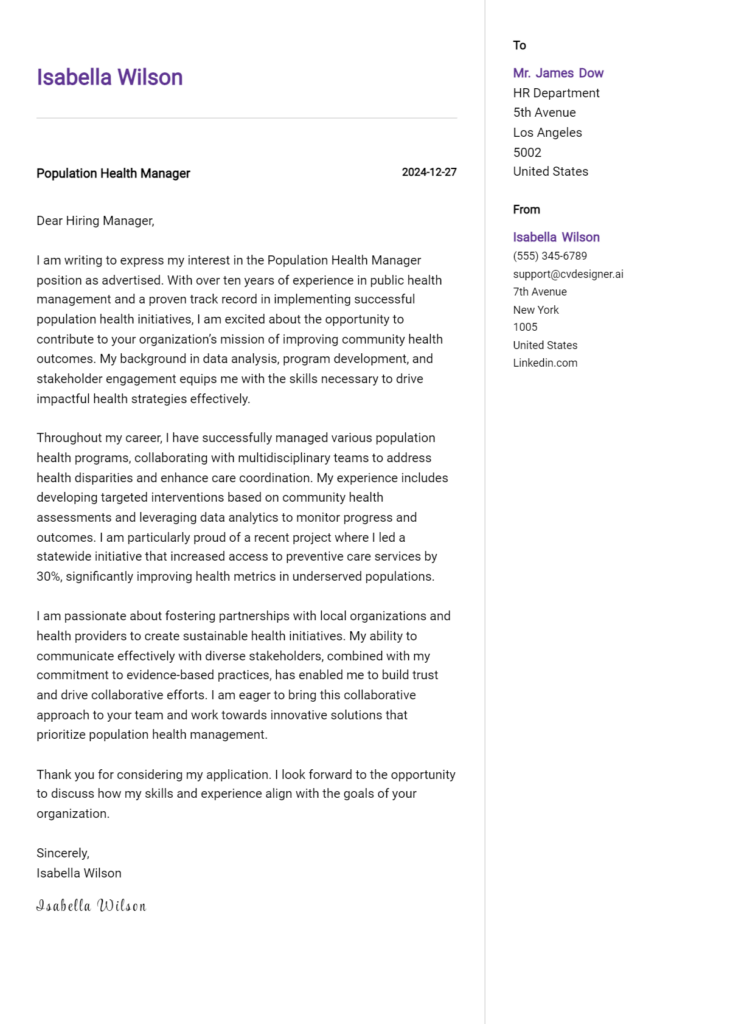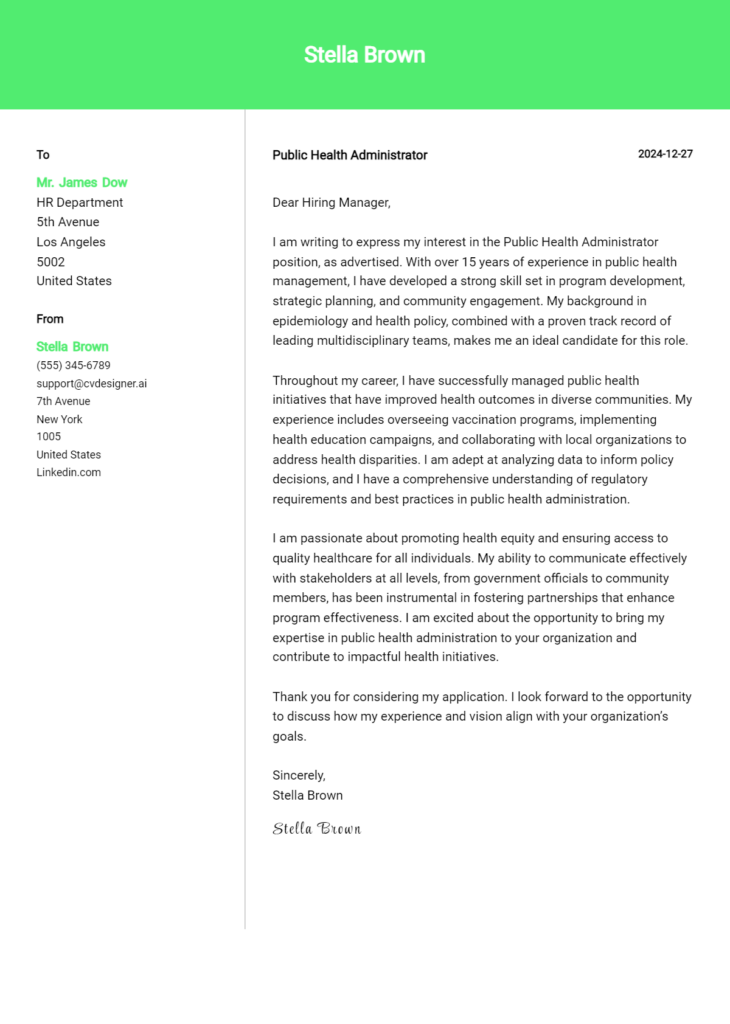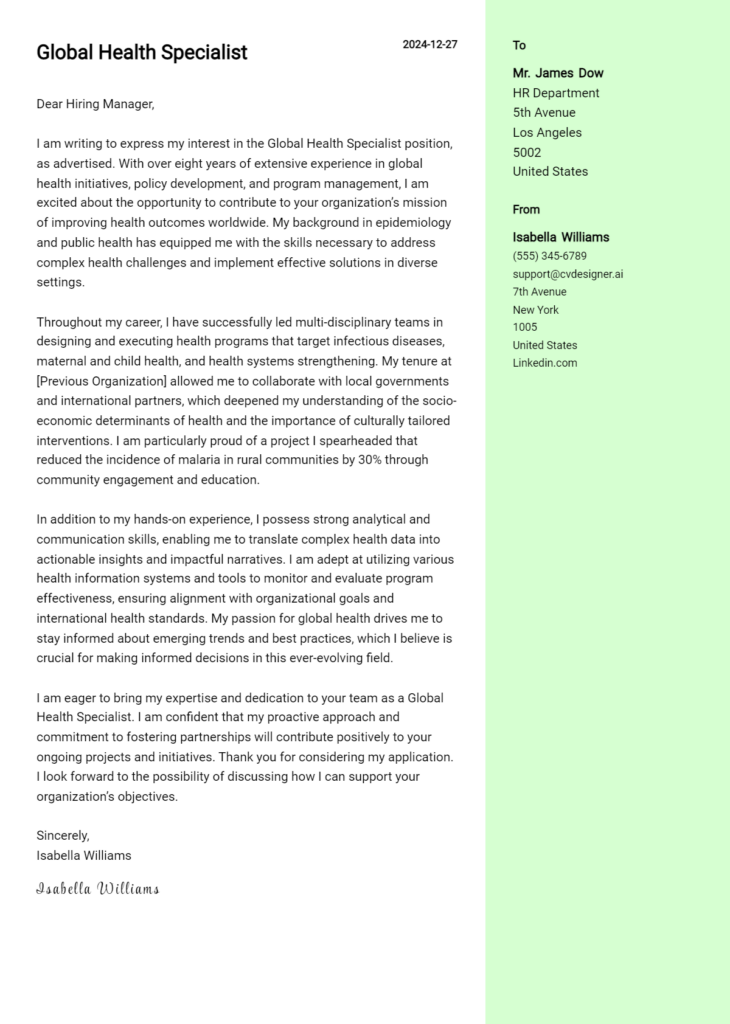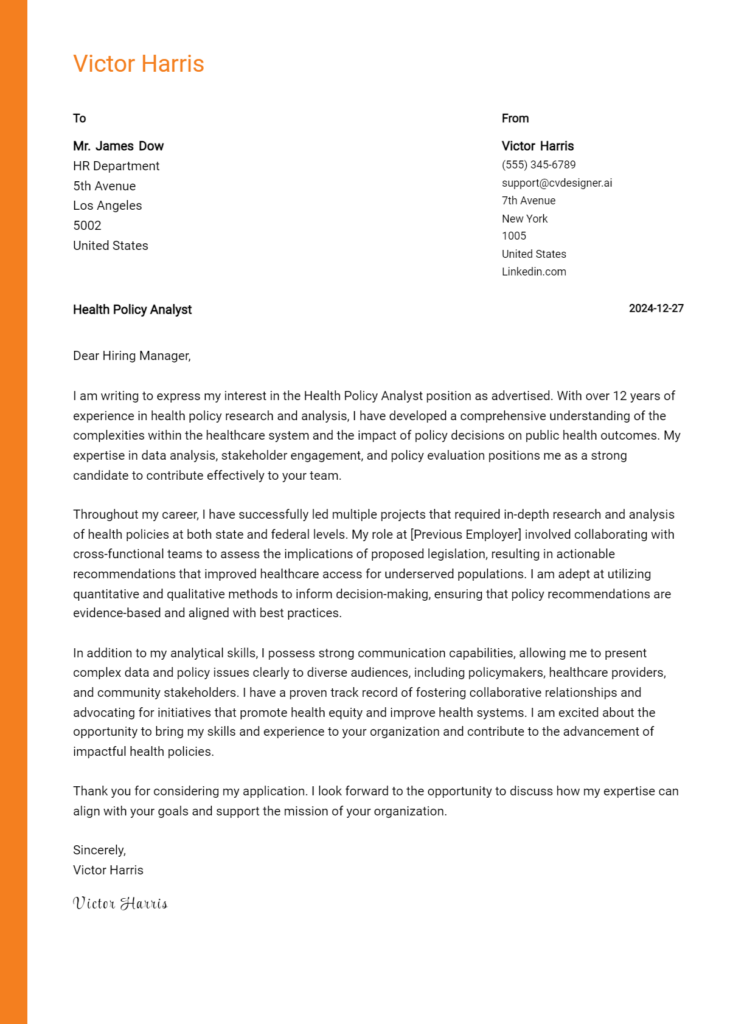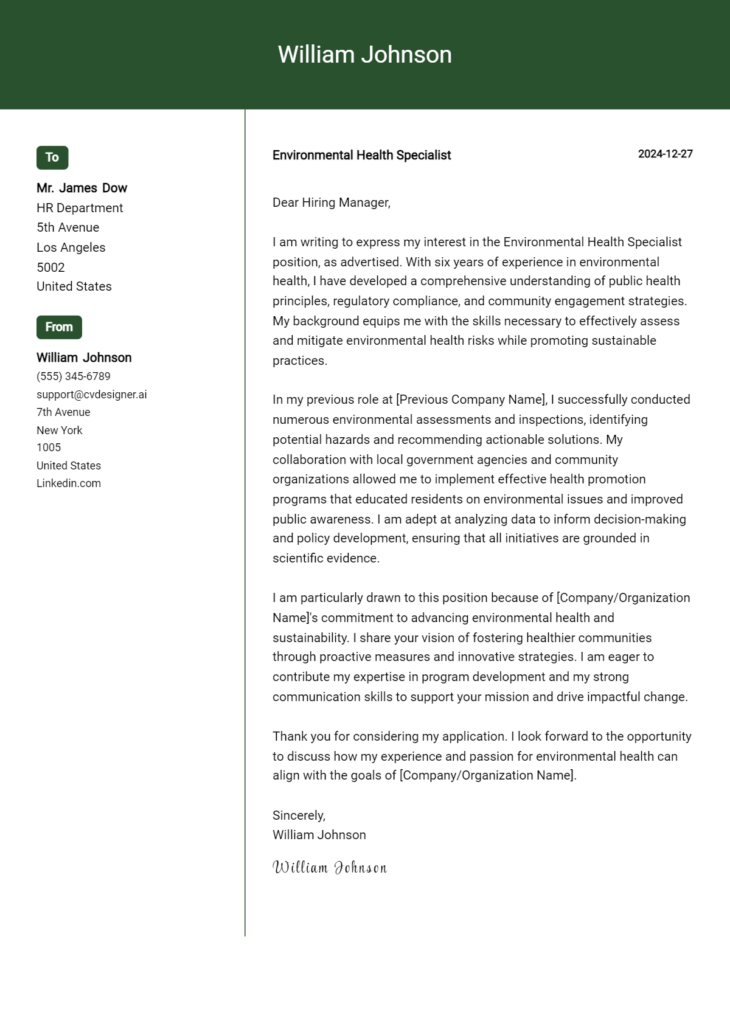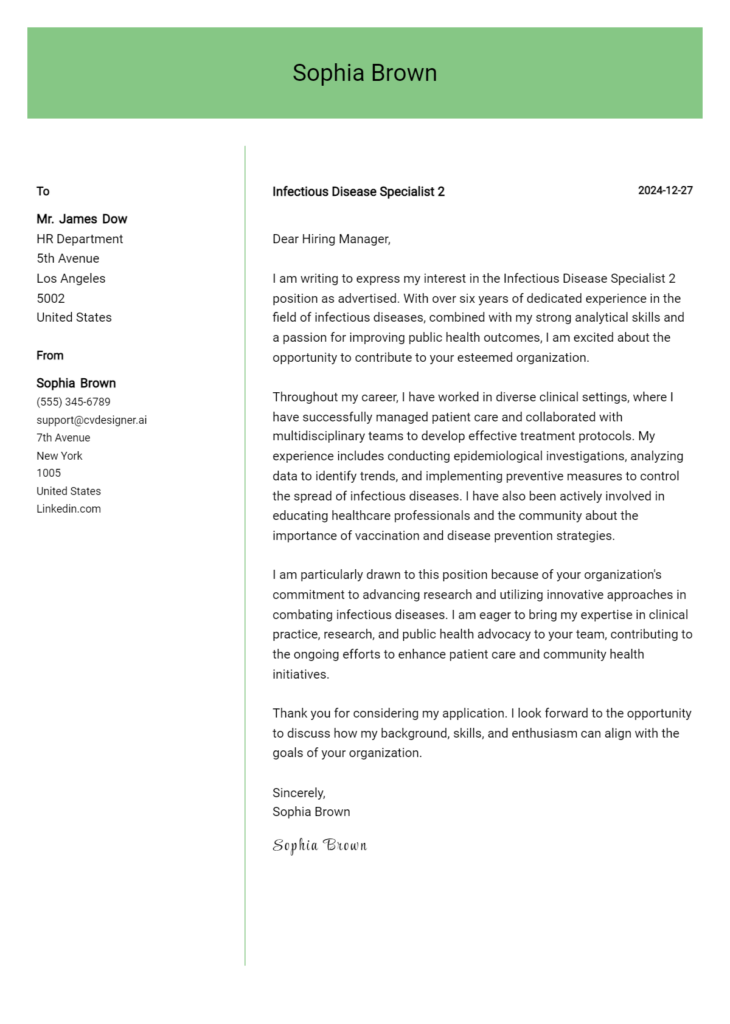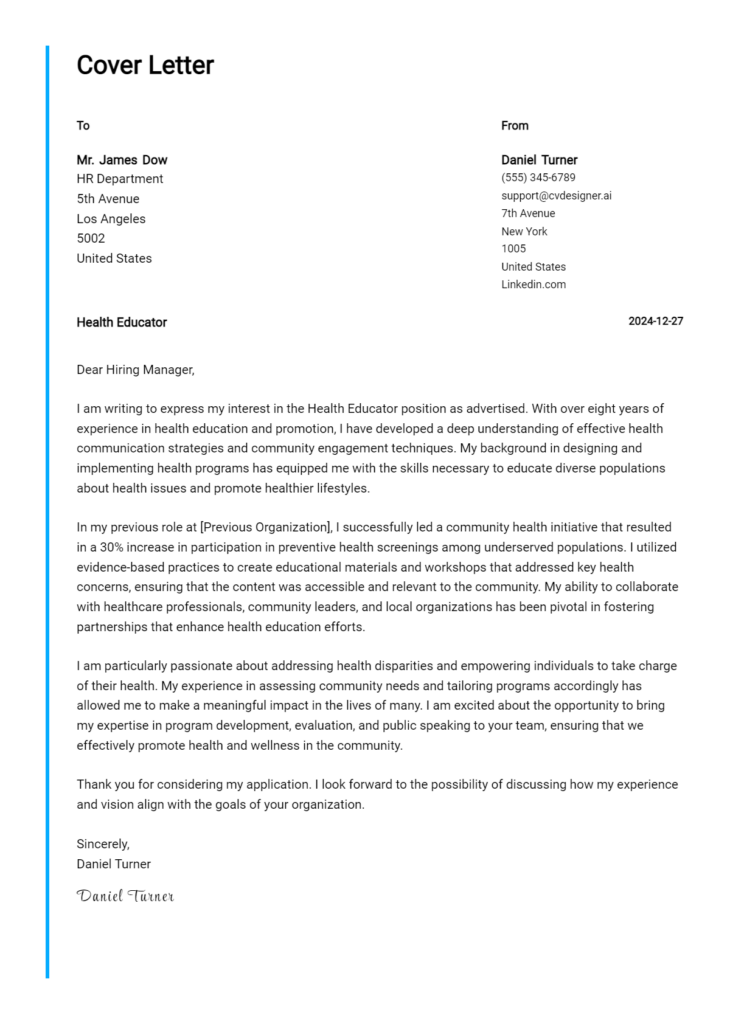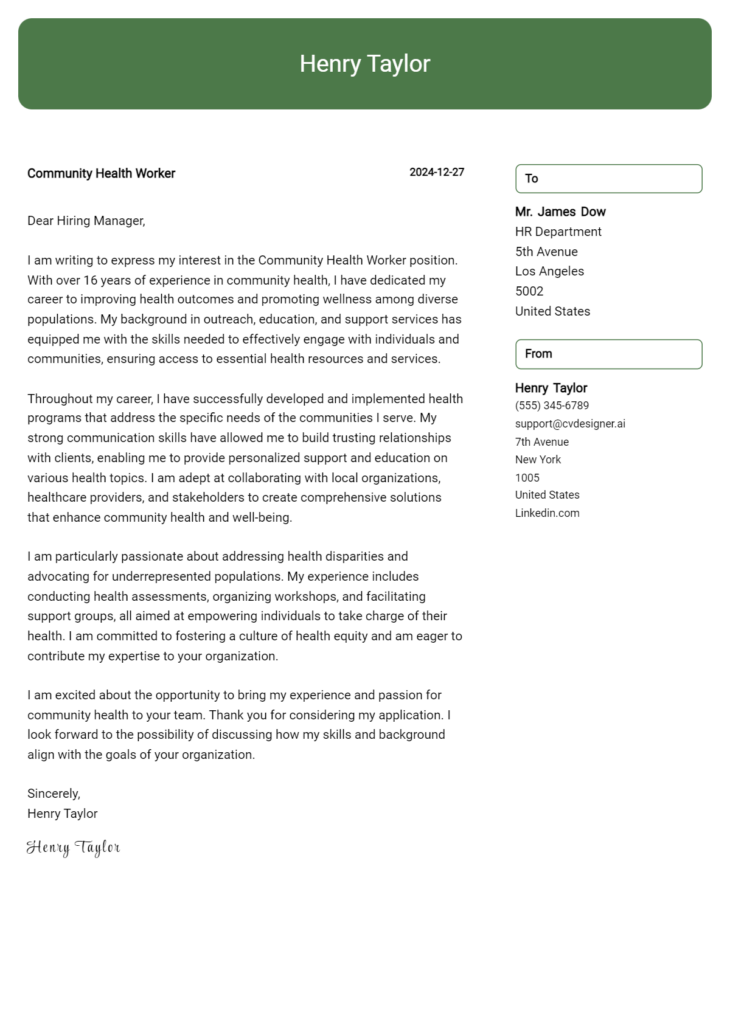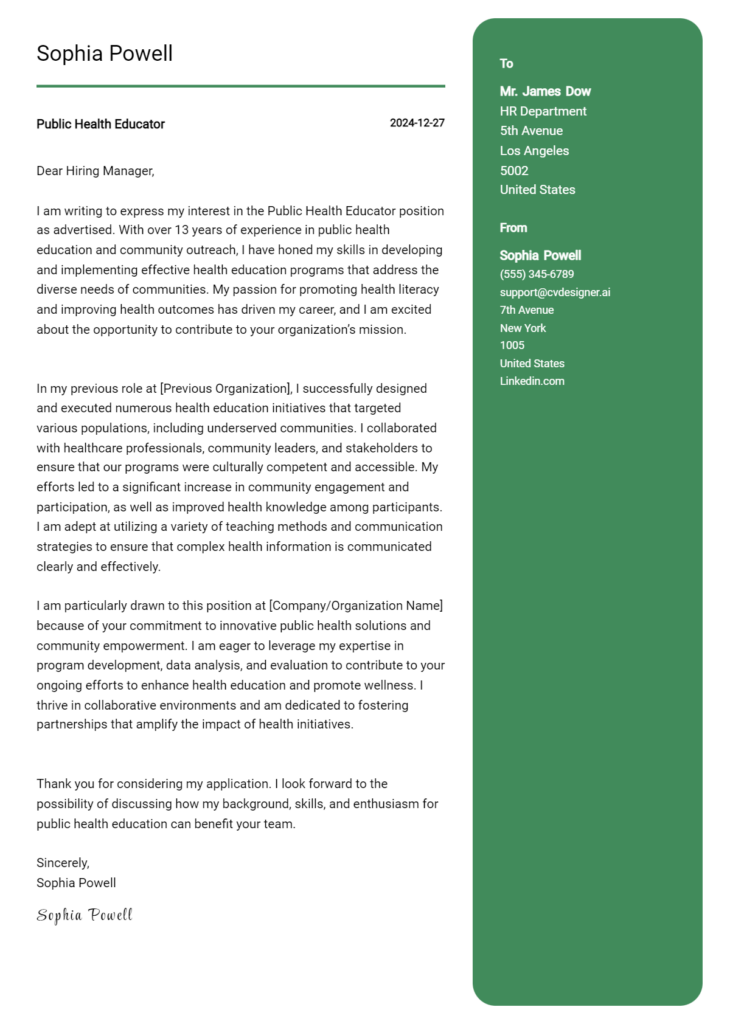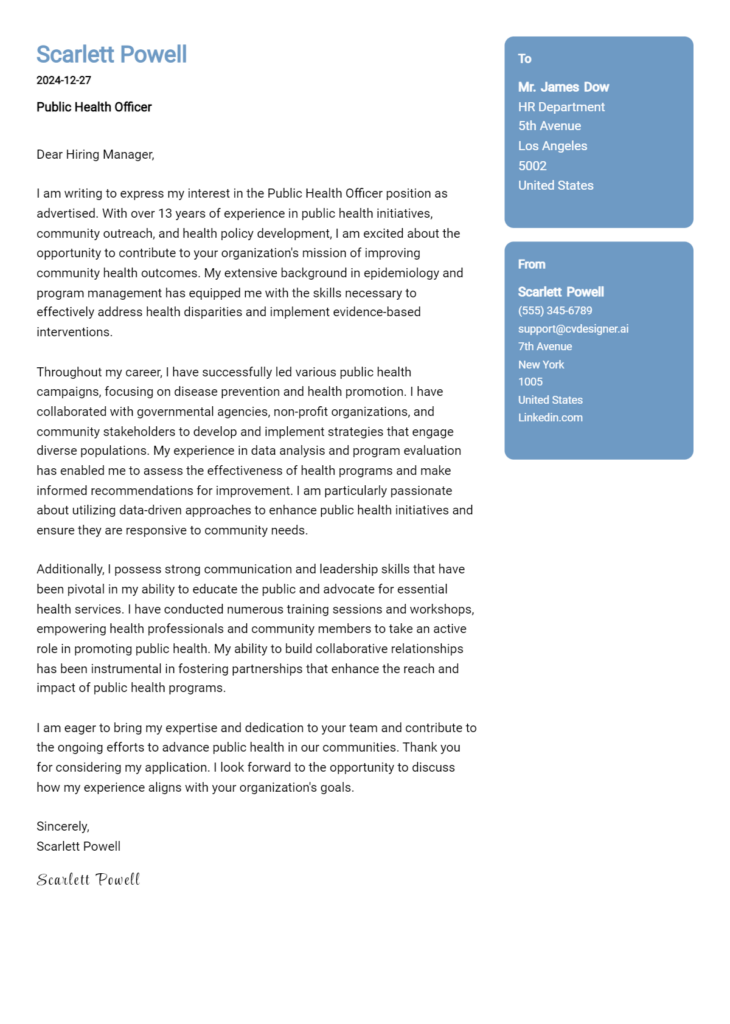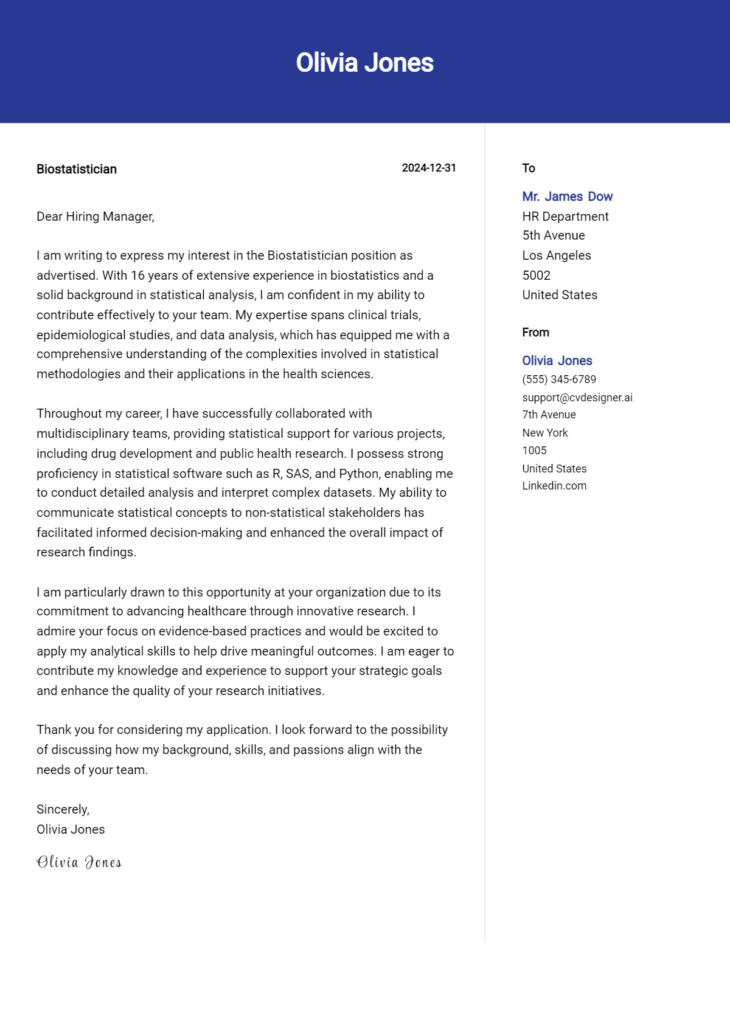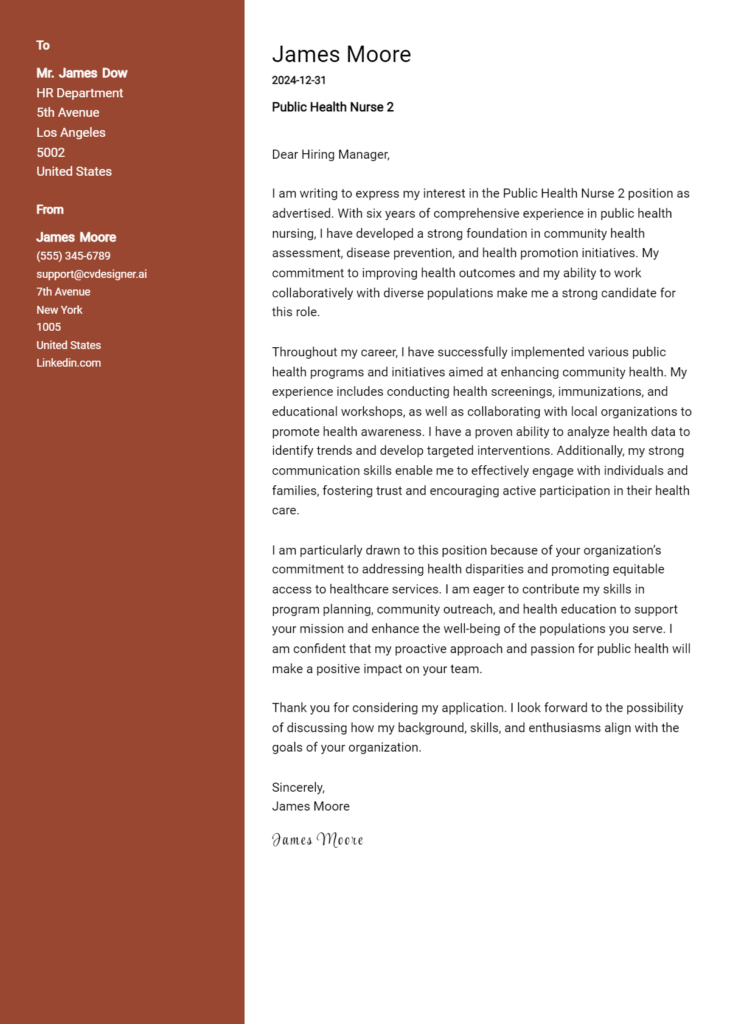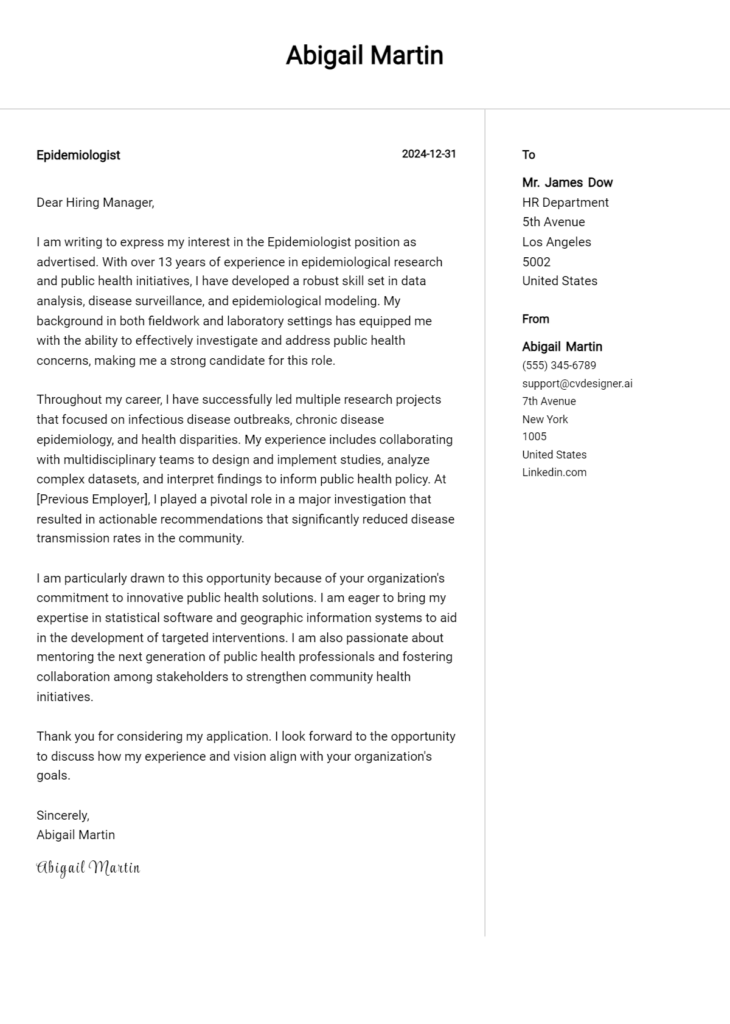Occupational Health Specialist Cover Letter Examples
Explore additional Occupational Health Specialist cover letter samples and guides and see what works for your level of experience or role.
How to Format a Occupational Health Specialist Cover Letter?
Crafting a compelling cover letter is crucial for an Occupational Health Specialist, as it not only showcases your expertise but also reflects your commitment to promoting workplace safety and employee well-being. The formatting of your cover letter is essential; it serves as the first impression you make on a potential employer. A well-structured letter can effectively communicate your knowledge of health regulations, risk assessments, and preventive measures, all of which are integral to the role.
In this guide, we will outline how to structure your cover letter, providing insights and examples tailored specifically for Occupational Health Specialists to help you create an exceptional document.
We will delve into the key components of a professional cover letter, including:
- Cover Letter Header
- Cover Letter Greeting
- Cover Letter Introduction
- Cover Letter Body
- Cover Letter Closing
Each section is vital for emphasizing your qualifications and professionalism. Let’s explore how to make your Occupational Health Specialist cover letter stand out.
Importance of the Cover Letter Header for an Occupational Health Specialist
The cover letter header is a critical component of your application as an Occupational Health Specialist. It sets the tone for your professionalism and attention to detail, providing key information about who you are and how to reach you. A well-structured header should include your contact information, the date, and the recipient's details to ensure clarity and facilitate communication. A clear and professional header not only helps the hiring manager quickly identify your application but also reflects your organizational skills, which are essential in the field of occupational health.
Strong Example
John Doe 123 Health St. Wellness City, ST 12345 (123) 456-7890 john.doe@email.com October 1, 2023 Jane Smith Hiring Manager HealthFirst Corporation 456 Care Ave. Wellness City, ST 12345
Weak Example
john doe wellness city, st (123) 456-7890 10/1/23 jane smith healthfirst corp
The Importance of a Cover Letter Greeting for an Occupational Health Specialist
The greeting of your cover letter is the first impression you make on a potential employer, and it sets the tone for the rest of your application. A well-crafted greeting demonstrates professionalism and shows that you have taken the time to personalize your correspondence by addressing the hiring manager directly. This small yet significant detail can make a big difference in how your application is received. To avoid generic greetings like "To Whom It May Concern," it's essential to research the recipient's name, which can often be found in the job listing or on the company's website. Taking this extra step reflects your attention to detail and genuine interest in the position.
Strong Greeting Example
Dear Ms. Johnson,
Weak Greeting Example
To Whom It May Concern,
The Importance of a Strong Cover Letter Introduction for an Occupational Health Specialist
A well-crafted cover letter introduction is crucial for any Occupational Health Specialist seeking to make a lasting impression on a hiring manager. This opening paragraph serves as the first opportunity to capture attention and convey genuine interest in the role. It should succinctly express the candidate's enthusiasm for the position while briefly highlighting key skills or achievements that align with the job. A strong introduction can set the tone for the rest of the cover letter, making it essential to balance professionalism with personality.
Strong Example
Dear [Hiring Manager's Name], I am excited to apply for the Occupational Health Specialist position at [Company Name], as advertised on [Job Board]. With over five years of experience in developing and implementing health and safety programs, I have successfully reduced workplace injuries by 30% in my current role. My commitment to fostering a safe work environment, combined with my expertise in regulatory compliance, makes me a perfect fit for your team.
Weak Example
To whom it may concern, I am writing to apply for the Occupational Health Specialist job. I think I would be good for this job because I have some experience in health and safety. I hope you consider my application.
Cover Letter Body for Occupational Health Specialist
The cover letter body for an Occupational Health Specialist plays a crucial role in presenting the candidate's unique qualifications and demonstrating their potential value to the company. This section provides an opportunity to showcase relevant skills, specific experiences, and notable projects that align with the organization's goals. By highlighting accomplishments, such as the implementation of successful health programs or participation in regulatory compliance initiatives, the candidate can illustrate their ability to make a meaningful impact within the workplace. This not only conveys their expertise but also emphasizes their commitment to promoting a safe and healthy work environment.
Strong Example
As an Occupational Health Specialist with over five years of experience, I successfully led a team to implement a comprehensive ergonomic assessment program that resulted in a 30% reduction in workplace injuries across our manufacturing facility. My role involved conducting detailed evaluations, recommending interventions, and educating employees on safe practices. Additionally, I collaborated with management to develop a health promotion initiative that increased employee participation in wellness activities by 50%, demonstrating my ability to drive positive health outcomes while aligning with corporate objectives.
Weak Example
I have worked in occupational health for a few years and have done some safety training. I think I would be a good fit for your company because I care about workers' health. I also attended some meetings about safety. I am looking for a job where I can contribute and help people feel better at work.
Importance of the Cover Letter Closing for an Occupational Health Specialist
A well-crafted cover letter closing is essential for an Occupational Health Specialist as it provides a final opportunity to summarize qualifications, reiterate interest in the role, and encourage the hiring manager to take the next steps, such as reviewing the resume or scheduling an interview. A strong closing leaves a lasting impression and reinforces the candidate's enthusiasm and suitability for the position, whereas a weak closing can diminish the overall impact of the cover letter.
Strong Example
In closing, I am excited about the opportunity to bring my expertise in occupational health and safety to your esteemed organization. With over five years of experience in developing health programs and conducting workplace assessments, I am confident in my ability to contribute meaningfully to your team. I look forward to the possibility of discussing my qualifications further and am eager to schedule an interview at your convenience. Thank you for considering my application, and I hope to hear from you soon.
Weak Example
Thanks for reading my cover letter. I think I would be okay for the job. If you want to look at my resume, it’s attached. Let me know if you want to talk sometime.
These tips will help candidates craft an effective cover letter for the role of Occupational Health Specialist. A well-written cover letter is vital for highlighting your technical skills, problem-solving abilities, knowledge of the Software Development Life Cycle (SDLC), teamwork experience, and passion for continuous learning. By addressing these areas, you can create a compelling narrative that sets you apart from other applicants.
Cover Letter Writing Tips for Occupational Health Specialist
Highlight Technical Skills: Begin your cover letter by showcasing your relevant technical skills. Mention specific tools and methodologies you are proficient in, such as risk assessment techniques, health data analysis, or ergonomic assessments. This demonstrates your capability to handle the technical demands of the role effectively.
Emphasize Problem-Solving Abilities: Employers value candidates who can think critically and solve complex problems. Share examples from your past experiences where you successfully identified occupational health issues and implemented effective solutions. Use quantifiable results to highlight the impact of your interventions.
Showcase SDLC Knowledge: If applicable, mention your understanding of the Software Development Life Cycle (SDLC) and how it relates to occupational health programs. Discuss any experience you have working on projects that required an understanding of SDLC principles, particularly in developing health management systems or software tools that streamline occupational health processes.
Demonstrate Teamwork Experience: Occupational health specialists often work in collaboration with various stakeholders. Include examples of successful teamwork in your cover letter, such as cross-functional projects with HR, safety teams, or management. Highlight your ability to communicate effectively and contribute to a positive team environment.
Express Passion for Continuous Learning: The field of occupational health is constantly evolving. Convey your enthusiasm for continuous learning by mentioning any relevant certifications, courses, or workshops you have undertaken. This not only shows your commitment to professional development but also indicates your proactive approach to staying current with industry trends.
For additional resources, consider exploring cover letter templates and using a cover letter builder to streamline the writing process and create a polished final product.
Common Mistakes to Avoid in an Occupational Health Specialist Cover Letter
Crafting a compelling cover letter is essential for any Occupational Health Specialist seeking to make a strong impression. Avoiding common mistakes can significantly enhance your chances of standing out to potential employers. Here are some pitfalls to watch out for:
Generic Greeting: Using a vague greeting like "To Whom It May Concern" can make your application feel impersonal. Always try to address the letter to a specific person or hiring manager.
Lack of Tailoring: Failing to customize your letter for the specific job can make it seem like you’re mass-applying. Highlight relevant experiences and skills that align with the job description.
Overly Technical Language: While expertise is crucial, using too much jargon can alienate some readers. Strive for a balance that showcases your knowledge while remaining accessible.
Ignoring the Formatting: Poor formatting can detract from the professionalism of your cover letter. Follow a clear cover letter format to ensure readability and organization.
Repetition of the Resume: Your cover letter should complement your resume, not repeat it. Use this opportunity to elaborate on your most pertinent experiences and how they relate to the role.
Neglecting a Strong Closing: A weak or vague closing can leave a lackluster impression. End with a strong call to action, expressing your enthusiasm for the opportunity and a desire to discuss your fit for the role further.
Spelling and Grammar Errors: Mistakes in your writing can undermine your professionalism. Always proofread your cover letter, or use tools to check for errors before submitting.
By steering clear of these common mistakes, you can create a more impactful cover letter that effectively showcases your qualifications as an Occupational Health Specialist. For inspiration, explore some cover letter examples that demonstrate effective techniques.
Cover Letter FAQs for Occupational Health Specialist
What should I include in my cover letter for an Occupational Health Specialist position?
Your cover letter should highlight your relevant experience, skills, and certifications. Start with a strong opening that captures the employer's attention. Include specific examples of your experience with workplace health assessments, ergonomic evaluations, and employee wellness programs. Mention any relevant certifications, such as Certified Occupational Health Nurse (COHN) or Certified Safety Professional (CSP). Tailor your content to reflect the requirements listed in the job description, demonstrating your understanding of the role. Additionally, expressing your passion for promoting workplace health and safety can set you apart.
How can I demonstrate my skills in the cover letter?
To effectively demonstrate your skills, use concrete examples from your past work experience. For instance, describe a situation where you successfully implemented a health program that led to improved employee well-being or reduced workplace injuries. Quantifiable outcomes, such as percentage reductions in incidents or increased participation in health initiatives, can make your achievements more compelling. Also, highlight soft skills like communication and teamwork by explaining how you collaborated with other departments to foster a culture of health and safety within the organization.
Should I address my cover letter to a specific person?
Yes, addressing your cover letter to a specific person is highly recommended. Doing so shows that you’ve taken the time to research the company and adds a personal touch. If the job listing does not specify a name, consider visiting the company’s website or LinkedIn to find the hiring manager's details. If you cannot find this information, using a general greeting such as "Dear Hiring Manager" is acceptable, but personalized greetings are always preferred. This small effort can make a significant difference in how your application is received.
How long should my cover letter be for an Occupational Health Specialist position?
Your cover letter should ideally be one page long, consisting of three to four paragraphs. Start with a compelling introduction, followed by a section detailing your relevant experience and skills. Conclude with a strong closing paragraph that reiterates your enthusiasm for the position and invites further discussion. Keeping your cover letter concise and focused ensures that it captures the reader's attention without overwhelming them with information. Aim for clarity and professionalism, ensuring that every word adds value to your application.
Build your Cover Letter in minutes
Use an AI-powered cover letter builder and have your letter done in 5 minutes. Just select your template and our software will guide you through the process.

